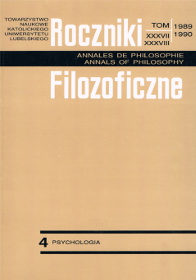Jerzy Strojnowski − profesor, lekarz, psycholog, psychoterapeuta, historyk medycyny, filozof, polityk...
Abstrakt
The paper presents the figure and scientific output of Professor Jerzy Strojnowski. Jerzy Strojnowski was born on 14th May 1922 in Włodzimierz Wołyński. He studied medicine at the Medical Academy in Cracow (1945-1949) and philosophy at the Jagiellonian University and the Catholic University in Lublin. He obtained his doctorate degree in medicine in 1951 and an MA in philosophy in 1955. From 1952 onwards he conducted classes in physiological psychology and biological mechanisms of behaviour at KUL. He obtained his specialization of the first degree in psychiatry in 1955 and the second degree in 1960. The title of habilitated doctor he obtained in 1969 on the basis of the treatise „Jędrzej Śniadecki’s Psychophysiology”. From 1971 on he is the head of the Chair of Psychopathology at KUL which he then transformed in 1979 into the Chair of Group Dynamics and Psychotherapy. He was the vice-dean of the Faculty of the Social Sciences (1981-1984). He is the co- -organizer and lecturer of a post-graduate course in counselling and psychotherapy for the clergy (since 1981). He was granted the title of professor in 1982. He works as a psychiatrist and goes abroad to participate in numerous trainings. He is member of many national and international learned societies and author of 250 publications. He conducts training in psychotherapy, in university didactics as well as Balint groups. In the period of 1989-1990 he worked in the Group of Advisers for the affairs of Social Psychology of the Civic Parlimentary Club. Being the leader of Democratic Union in Lublin and member of the National Council of Democratic Union he ran for the Senate of Poland from the list of this party in Chełm voievodeship (1991). Profesor’s scientific interest is concentrated on a few domains. One of his passion is the history of medicine. He devoted many of his publications to the history of health service and medical knowledge in Polish territories during the Middle Ages and Partitions. He is the author of many biographies of some oustanding figures in Polish medicine published, among other things, Polish Biographic Dictionary. He was interested in Polish social psychiatry and psychoanalysis. A lot of publications written by the professor deal with psychophysiological and neurophysiological problems, for instance the functioning of the human brain. The professor is the author of modern academic handbooks on physiological psychology and biological mechanisms of behaviour. Other works deal with the interpretation of various phenomena of psychological and psychosocial life. The professor is also interested in psychotherapy and group dynamics. He devoted an interesting monography to these problems. Moreover, he dealt with psychotherapy according to C. G. Jung, client- -centred therapy by C. R. Rogers, family systemic therapy by D. Mostwin or J. H. Schultz’s autogenic training. He was interested in the possibilities for group dynamics to be applied in didactics, pastoral care and upbringing. He conducted research on the question how the child’s personality is being shaped under the influence of family interactions and environment. He analyzed the influence of emotional deprivation on the development of personality. He studied the structure and dynamics of the interpersonal relations in the families of persons ill with schizophrenia. Professor’s scientific interest is complemented in the domain of philosophy, theology and religion. The professor undertakes, popularizes in Poland and in a singularly manner develops the philosophical thought of Teilhard de Chardin. The subject-matter of many papers written by the professor, published among other things in Więź, is concentrated on ethical, anthropological, social, and religious problems. Especially valuable is his study concering a psychoanalytical approach to the basic questions of the psychology of religion. Being a perfect didactician the professor made every effort to induce thought, initiate discussion with students and promote „alive study”. In the course of 40 years of his work at KUL he contributed immensely to the training of many generations of psychologists.
Copyright (c) 1990 Roczniki Filozoficzne

Utwór dostępny jest na licencji Creative Commons Uznanie autorstwa – Użycie niekomercyjne – Bez utworów zależnych 4.0 Międzynarodowe.





